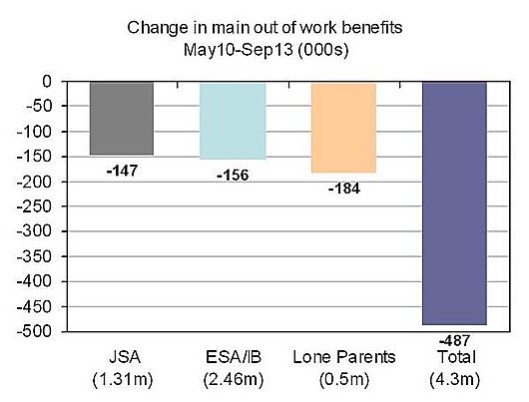
Mansel Aylward, former chief medical officer at the Department of Work and Pensions, now director of the (UnumProvident) Centre for Psychosocial and Disability Research at Cardiff University: Architect of misery?
If we know anything at all about the Work Capability Assessment for sickness and disability benefits, we know that it doesn’t work. In fact, it kills. There is a wealth of evidence proving this, and if any readers are in doubt, please take a look at the other article I am publishing today, MPs tell their own Atos horror stories.
Much has been made of this fact, without properly – in my opinion – addressing why it doesn’t work. The apparent intention is an honourable one – to help people who have been ‘parked’ on disability benefits back into work, if it is now possible for them to take employment again, and to provide support for those who cannot work at all. What went wrong?
Let’s start at the beginning. The WCA is, at least nominally, based on the biopsychosocial model developed by George Engel. He wanted to broaden the way people think about illness, taking into account not only biological factors but psychological and social influences as well. He contended that these non-biological influences may interfere with a patient’s healing process.
The idea has been developed to suggest that, once identified, the non-biological factors inhibiting healing would be neutralised via a variety of support methods. Stressful events in a person’s life or environmental factors are acknowledged as having real effects on their illness, and it can be seen that this confers a certain amount of legitimacy on symptoms that are not currently explainable by medicine.
Engel stated, in 1961, “Many illnesses are largely subjective – at least until we as observers discover the parameters and framework within which we can also make objective observations. Hyperparathyroidism… was a purely subjective experience for many patients until we discovered what to look for and which instruments to use in the search.” He also warned that people engaged in research should “see what everyone else has seen and think what nobody else has thought” – as long as they don’t automatically assume that their new thought must be correct.
The Engels theory forms the basis of the system of insurance claims management adopted by US giant Unum when its bosses realised that their profits were being threatened by falling interest rates – meaning the company’s investments were losing value – and a rise in claims for “subjective illnesses” which had no clear biological markers – Myalgic Encephalomyelitis (ME), also known as Chronic Fatigue Syndrome (CFS), Fibromyalgia, Chronic Pain, Multiple Sclerosis, Lyme Disease, even Irritable Bowel Syndrome (IBS).
As I wrote on Wednesday, Unum adapted the biopsychosocial model into a new medical examination that stripped it of its ‘bio’ and ‘social’ aspects in order to concentrate on the ‘psycho’ – with a relentless emphasis on an individual claimant’s beliefs and attitudes.
The new test aggressively disputed whether the claimant was ill, questioning illnesses that were “self-reported”, labelling some disabling conditions as “psychological”, and playing up the “subjective” nature of “mental” and “nervous” claims. The thinking behind it was: Sickness is temporary. Illness is a behaviour – all the things that people say and do that express and communicate their feelings of being unwell. The degree of this behaviour is dependent on the attitudes and beliefs of the individual, as well as the social context and culture. Illness is a personal choice. In other words: “It’s all in the mind; these people are fit to work.” (as I mentioned in When big business dabbles with welfare; a cautionary tale)
Already we can see that this is a perversion of Professor Engel’s theory, using it to call an individual’s illness into question, not to treat it. Yet this is the model that was put forward to the Department of Social Security (later the Department of Work and Pensions) by its then-chief medical officer, Mansel Aylward, in tandem with Unum’s then-second vice president, John LoCascio.
Together they devised a new ‘All Work Test’ that would not actually focus on whether an individual could do their job; instead it would assess their general capacity to work through a series of ‘descriptors’. Decisions on eligibility for benefit would be made by non-medical adjudication officers within the government department, advised by doctors trained by Mr LoCascio. Claimants’ own doctors would be marginalised.
When New Labour came to power, Mansel Aylward was asked to change the test to reduce the flow of claimants with mental health problems. In came the ‘Personal Capability Assessment’, which again focused on what a person was able to do and how they could be supported back into work.
It is at this point that US IT corporation Atos Origin (now Atos Healthcare in the UK) became involved. The task of administrating the PCA was contracted out to a company which was taken over by Atos, meaning its employees – who had no medical training – could now assess claims for sickness and disability benefits, using the company’s Logical Integrated Medical Assessment tick-box computer system. These evaluations proved unreliable and the number of successful appeals against decisions skyrocketed.
So in 2003 the DWP introduced ‘Pathways to Work’, in which claimants – now labelled ‘customers’ – had to undertake a work-focused interview with a personal advisor. If they weren’t screened out by the interview, they would go on to mandatory monthly interviews where they would be encouraged to return to work and discuss work-focused activity. I can assure readers, from personal experience with Mrs Mike, that this activity remains a prominent part of the DWP’s sickness and disability benefit policy.
Mansel Aylward is no longer at the DWP, though. In 2004 he was appointed director of the UnumProvident Centre for Psychosocial and Disability Research at Cardiff University (it has since dropped the company title from its name). Was this as a reward for services rendered in getting Unum and its practices into the heart of the UK government?
Let’s have a look at some of the ‘descriptors’ that are being used to determine a claimant’s – sorry, customer’s – fitness for work in what is now called the ‘Work Capability Assessment’. I am grateful to Helen Goodman, Labour MP for Bishop Auckland, who provided this information during yesterday’s debate on the Atos WCA in the House of Commons. She said a person who…
“Cannot mount or descend two steps unaided by another person even with the support of a handrail”;
“Cannot, for the majority of the time, remain at a work station, either…standing unassisted by another person…or…sitting…for more than 30 minutes, before needing to move away in order to avoid significant discomfort or exhaustion”
“Cannot pick up and move a one litre carton full of liquid”;
“Cannot use a pencil or pen to make a meaningful mark”;
“Cannot use a suitable keyboard or mouse”;
“Is unable to navigate around unfamiliar surrounding, without being accompanied by another person, due to sensory impairment”;
“Is at risk of loss of control leading to extensive evacuation of the bowel and/or voiding of the bladder, sufficient to require cleaning and a change in clothing, not able to reach a toilet quickly”;
“At least once a month, has an involuntary episode of lost or altered consciousness resulting in significantly disrupted awareness or concentration”;
“Has an epileptic fit once a fortnight”;
“Cannot learn anything beyond a simple task, such as setting an alarm clock”;
“Has reduced awareness of everyday hazards leading to a significant risk of…injury to self or others; or…damage to property or possessions such that they frequently require supervision”;
“Cannot cope with minor planned change” such as a change to lunchtime;
“Is unable to get to a specified place with which they are familiar, without being accompanied by another person”
… is “fit for work”.
A person in the following category is also deemed fit for work, if: “Engagement in social contact with someone unfamiliar to the claimant is always precluded due to difficulty relating to others or significant distress experienced by the individual.”
Kate Green, Labour MP for Stretford and Urmston, added: “My constituents told me categorically last week that they believe that the whole system was deliberately designed and operated to trick them — to make them incriminate themselves and to catch them out.
“They firmly believe that the system is deliberately designed, not to assess and then help them into work if they are fit for it, but simply to stop paying benefits wherever possible.
“There are far too many instances of trickery and misleading people and of distorting what they have done, said and reported and drawing conclusions from that. That is happening far too often.
“It is an absolute disgrace that we should run a public assessment process in such a discredited way.”
It seems to be a result of Professor Aylward’s work that the main influence on government welfare reform has been a perversion of a perversion of a theory that has not been shown to work. Authentic evidence is disregarded by those in power, who clearly continue to persecute the sick while feeding the profits of private concerns.
I wonder what he would have to say, if he were to be confronted by the evidence of what his policies have done to the sick and disabled of this country – as spelled out, in the House of Commons, by MPs from many parties.
Afterthought: It should be noted that Professor Aylward is on record as having expressed doubts about the Work Capability Assessment and the current system, as run by the government, with the caveat that he has not been involved for several years.
He told the Black Triangle Campaign: “I will make myself aware … but I think that I’m a man of integrity … and if I think that the Work Capability Assessment … test or whatever … is not proper … I will speak out against it.”
In the light of what happened while he was at the DWP, I leave it to readers to judge whether he will.
![[Image: Ktemoc Konsiders - http://ktemoc.blogspot.co.uk/]](https://mikesivier.files.wordpress.com/2014/07/conflict-of-interest.jpg?w=529&h=479)













